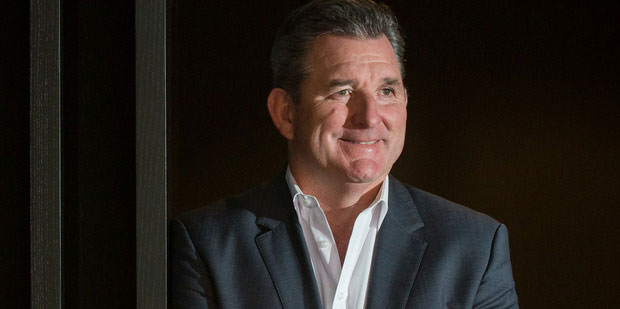DDB NZ & Australia chairman/ceo Marty O’Halloran says DDB offices in Auckland and Sydney will save hundreds of thousands of dollars a year by cutting back its entries to global awards shows.
Earlier this week the agency group’s New York-based global creative head Amir Kassaei announced the Omnicom-owned network would scale back involvement in awards shows globally – and look to find new ways to measure their creative output.
O’Halloran says the move was driven by the desire to get off the never-ending award treadmill and was about “drawing a line in the sand”, as well as focussing their people on client results.
“There’s an absolute obsession with awards and as a result more and more shows have cropped up with more and more categories, and it’s become this sort of game,” he told Australian site Mumbrella. “Everyone is chasing success in that environment.
“We’ll still be supporting our local shows, but what you will see is we’ll be really selective in what we do globally and we’ll only be concentrating on the ideas and campaigns that create great results for our clients and are fully supported by our clients – and also ideas of scale that have had a positive impact on society rather than clever little ideas that have never had any scale and have made no impact.”
Pushed on the effect a focus on awards has had on the agency he conceded it probably had acted as a distraction, but said the new edict was a chance to remedy that.
“We’ve not had clear direction to our creatives in terms of what management want out of our agencies,” he said. “With that direction the creatives will know what’s expected and know what the boundaries are and what’s important to us and most importantly our clients.
“I think there’s no doubt that globally – and we’ve seen it at this part of the world and it’s even worse in South America and Asia – the boundaries have been stretched and a lot of the work that’s being recognised doesn’t fit the criteria we’re setting ourselves going forward.”
He said while the agency would still enter big shows such as the Cannes Lions, it would cut down on the amount of work entered save some of the “hundreds of thousands of dollars” spent locally on entering.
“When I look at the business, we have two full-time editors putting together case study videos and it’s a crazy waste of resource instead of doing other things that move ours and client business forward.”
Clients will also get a greater say in the work the agency takes to these shows. “We want our clients to endorse everything we enter because of the positive influence they’ve had on their brands, whether that’s a sales lift or some other criteria.
“And that’s really where we’ve got to draw that line in the sand and say we’re not going to just enter pretty ideas that have never had the scale.”
Effectiveness awards will remain a focus as will local Australia & NZ awards. “For us our local shows are really important as it connects our local industry and local talent moving up, and it celebrates the best ideas in the local markets here in Australia and New Zealand.
“For us recognition on the global stage is really important and things like Cannes is a really important global show we’ll continue to support, but under the guidelines Amir’s talking about – what we classify as the right things to enter.”
M&C Saatchi Australia head Andy DiLallo takes a different view, saying awards were an important way of showcasing the agency’s creative skills to potential employees. “Winning is a recruitment tool to attract top tier talent,” he said.
The Gunn Report, which ranks agencies and networks based on how many awards they have won at various global shows, has grown in influence for many creatives in recent years. However O’Halloran said that will become “less relevant” to the agency after this decision.
He told Mumbrella: “The industry has to settle on how to rank and measure different agencies, and I’d be asking all those bodies what is the best way to measure who is being successful at the end of the day.”
DDB counts McDonald’s as one of its biggest clients globally. When the fast food giant was named Advertiser of the Year at Cannes in 2014 its global head of brand Matt Biespiel told an audience the company saw awards as important, saying they had research showing award-winning work yields a “54 per cent increase on spend”.
Explaining why creativity is important to the brand Biespiel said: “Competitors can replicate the tangible aspects of our brand, but they can’t replicate the intangible assets of our brand, like creativity, culture or the five sonic notes.”
However O’Halloran said he believed McDonald’s would “applaud our move”.
“We’re extremely tight and we’re always coming to them with ideas to move their brand forward and we’re known as one of the most creative agencies for McDonald’s globally,” he said.
“Anything we do to create more time to do that for them I know they applaud that, and there’s a motive in it for me as at the end of the day I have to build stronger long-term business with clients. This obsession with awards has taken away from what we’re here to do.”
O’Halloran said DDB would be “quite ruthless”.
“Generally speaking there’s huge support we’re getting from our people and some of the other industry players.”
Asked if this was set to be a long-term commitment from the agency O’Halloran told Mumbrella the board were “100% behind it” adding it had buy-in from local creative directors as well.
“There’s not going to be any stopping or change in momentum from our point of view in being a creative leader, that doesn’t change. It’s how we measure that success based on the shows that we think matter and most importantly the ideas we think are worthy to be entered.”
Some estimates put the cost of a large agency’s Cannes Lions entries at $1500 per entry.
DDB NZ has yet to comment on O’Halloran’s edict, but feedback to the Mumbrella site has been mixed.
“This article and Amir’s comments just show how stuck in the past DDB management are,” wrote one. “They’re still talking about scam. All of the work entered into Direct, Promo or Integrated categories must feature results and prove that the work has solved a tangible business problem. It’s the difference between winning and being thrown out of the category.
“Most agencies worked this out years ago and only enter the work clients are really happy about. Isn’t that the only work that gets made and run for real?
So why were DDB still producing work that clients weren’t happy with? This does nothing to make me question awards and everything to question shoddy business practices.”
And another: “The truth is that DDB has failed to sell/conceive really greatwork for/to for clients like McDonalds over the last few years. This has embarrassed both the agency and the clients. In an attempt to remain relevant they have fallen back on scams etc to get the awards numbers up.
“This is a lack of focus on great work for real clients is nothing to do with Award shows. If they had great work for their large clients it would be business as usual.
“This whole move is simply scapegoating awards to cover up for their own internal lack of focus.
Great to see they are getting their act together, but don’t try to make out that agencies with great work moving the dial forward for their clients, are in the same boat as you, DDB.”
- Read the original piece written by Amir Kassaei in Campaign magazine: http://www.campaignlive.co.uk/article/end-false-recognitions/1379124.
Share this Post



